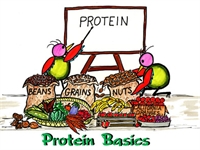
Thinking about becoming vegetarian? The truth about proteins.
Important Notice: Our web hosting provider recently started charging us for additional visits, which was unexpected. In response, we're seeking donations. Depending on the situation, we may explore different monetization options for our Community and Expert Contributors. It's crucial to provide more returns for their expertise and offer more Expert Validated Answers or AI Validated Answers. Learn more about our hosting issue here.

Thinking about becoming vegetarian? The truth about proteins.
You must be logged in to post a comment.
It is safe to say that America has a food obsession.
Whether this obsession surrounds excessive weight gain or loss, Americans just know surprisingly little about health and nutrition. Even with all the talk of our obesity epidemic, those of us who choose to cut certain things from our diet are often looked at strangely.
Being a vegan, the most common question I am asked is, ‘Where do you get your protein?’
Vegetarians are individuals who cut meat from their diet, and vegans cut all animal products. Most people think vegetarians just eat a lot of eggs or peanut butter, while vegan protein sources remain a mystery.
The recommended amount of protein for an adult female is around 45 grams, and for an adult male about 55 grams. While meat and eggs are great sources of protein, the notion that those are the only natural choices is incorrect. Vegetarians and vegans do not necessarily need to supplement their diets with shakes and pills either (though I know a few that do, those individuals are bodybuilders). It is true that a 6oz steak has about 40 grams of protein, and a large egg has about 6, but those are not your only options.
What most people don’t realize is that there is at least a little bit of protein in most things you eat.
Vegetables, for example provide small amounts of protein. On the higher end, a serving of broccoli has about four grams of protein. Asparagus, artichoke and spinach each offer three, and most other vegetables fall somewhere below that. Compared to one steak, that’s nothing. But most people don’t eat the recommended amount of vegetables. According to the Harvard School of Public Health, an individual with an average calorie intake of about 2000 should have around nine servings of vegetables a day, which is about 4.5 cups. So say you ate nine servings of broccoli in one day (mmmm, right?) you would have eaten 36 grams of protein!
Ok, realistically let’s say you did eat nine servings of vegetables and they weren’t all broccoli. You’re probably a man, because most women don’t aim for 2000 calories a day. We’ll say your average amount of protein per serving was around 2.5 grams, so you’re already at 22.5 grams of protein. That’s not 55, so let’s take a look at what else you can eat in a day.
I cup of tempeh (a protein made of whole soybeans) has 41 grams of protein, and 1 cup of cooked soybeans has 29 grams. Only 3 oz of seitan (a protein made from wheat) has 31 grams of protein, a cup of lentils has 18, 1 cup of chickpeas has 12, and ¼ cup of almonds has 8. Even a cup of spaghetti has 8 grams of protein.
Choosing from that list can bring you closer to your daily amount, and I haven’t even gone into beans and other legumes that are probably a part of your diet already. In my experience, if you’re careful to eat the right amount of vegetables and whole grains, proteins will naturally fall into place.